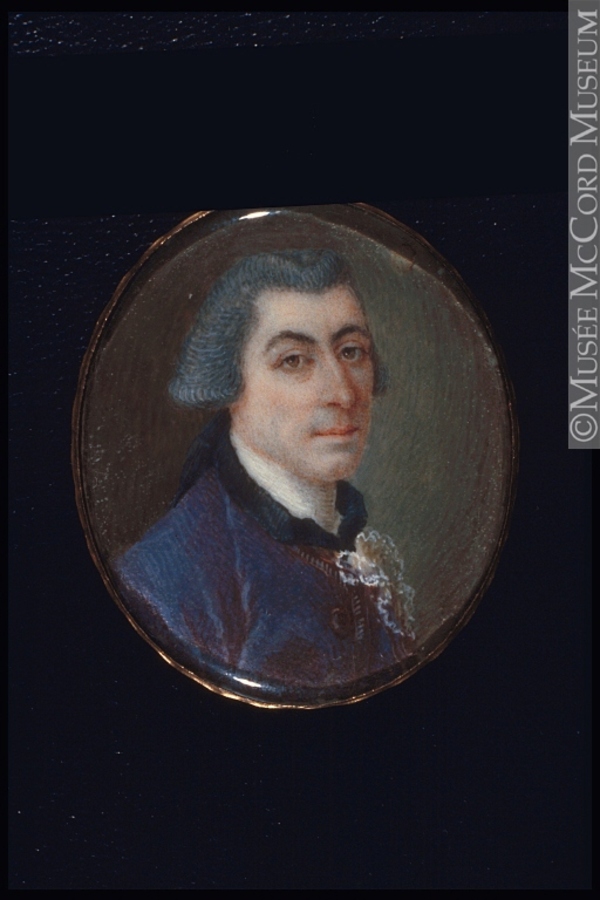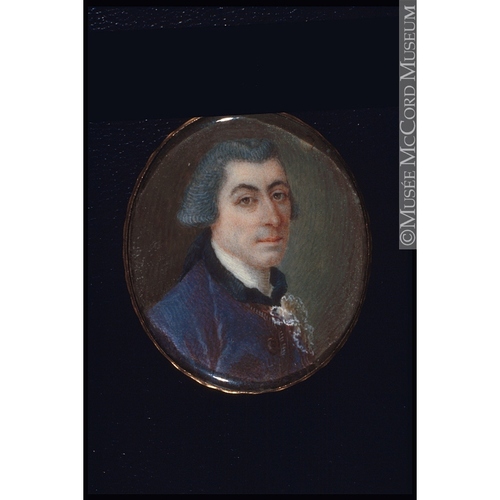
Source: Link
NELSON, WILLIAM, teacher; b. 1750 in Newsham (North Yorkshire), England, son of George Nelson; d. 10 June 1834 in William Henry (Sorel, Que.).
William Nelson began teaching school in his native Yorkshire at age 16. Ten years later he moved to London and taught there until May 1781 when he emigrated to the province of Quebec. He later wrote that there were “but Two teachers worthy of the name” when he arrived, one at Quebec, the other at Montreal. Nelson settled at Trois-Rivières, then a busy centre of loyalist immigration, and opened a school there. He offered to board students and to teach them English, French, Latin, Greek, writing, bookkeeping, mathematics, geography, and navigation On 24 May 1785 at Sorel Nelson married Jane Dies, the 18-year-old daughter of a tory loyalist from Catskill, N.Y. Two years later he petitioned the grand jury at Montreal, “setting forth his desire of removing his school from Three Rivers to Montreal provided he should meet with proper encouragement.” The jury recommended that he be granted “the bounty allowed by Government for a school master,” a motion approved by Lord Dorchester [Guy Carleton*]. By 1790 Nelson had opened a school in Montreal; in the following year he had 48 students and in 1792, 32. He remained in Montreal only until 1794, when he moved his family to a farm he had acquired south of William Henry. There he held school in his house, boarding students and teaching the same subjects he had offered at Trois-Rivières. His pupils were mainly the children of British officers stationed at the military post. In addition he had, in his own words, “four, often even five scholars of poor Canadian parentage, whom he instructed from principles of consideration, say compassion – say for Nothing!” He also taught his own children, three of whom became medical doctors; Wolfred* and Robert* would later gain prominence in the political struggles of Lower Canada. The eldest son, George*, became a fur trader.
The life of a country schoolmaster was a struggle to feed his family. By Nelson’s account, only “delusive hopes continually presenting themselves of new and further encouragement of better times” kept him at his work. In 1801, with his family numbering five boys and three girls, he petitioned the lieutenant governor, Sir Robert Shore Milnes*, for assistance. He was accorded a salary of £60 per annum “as an inducement not to leave William Henry.” The grant was generous and it gave Nelson, and his family, a security which he had not known in the 20 years he had been teaching in Lower Canada.
In 1821, however, his peaceful life was shattered by a series of events initiated by Aaron Allen, a wealthy local merchant. In that year the Royal Institution for the Advancement of Learning determined to establish a schoolhouse in William Henry, which would be administered on the institution’s behalf by local visitors, of whom Allen became one. Nelson – in his 70s and set in his ways – was appointed the teacher but he disapproved of removing the school from his own house and disliked being accountable to others for the first time in his career. When the visitors decided in 1822 to prevent Nelson from charging fees, he complained bitterly and threatened to resign. A few days later, Allen’s son-in-law applied for the post. He did not, however, meet with the approval of another visitor, the Reverend John Jackson, who considered Nelson “old but effective.” Nelson continued to teach but refused to acknowledge the authority of the institution. In 1823, when the visitors imposed 35 free pupils on him, he dismissed these students. On 7 Jan. 1824, following the receipt of “a mortifying and authoritative” directive from the Reverend Joseph Langley Mills, secretary of the institution, who considered Nelson’s salary of £60 per annum a sinecure, Nelson resigned or, as he put it, “liberated himself” from the institution. Allen’s son, Edward Carter, succeeded him.
William Nelson continued to teach at home and to charge his pupils a small fee of one dollar per month; without his salary, however, he encountered increasing difficulties as the years passed. In 1831, after almost 65 years as a teacher, he sent a petition to the governor, Lord Aylmer [Whitworth-Aylmer*], requesting a pension for his services. “Fifty years, and upwards,” he wrote, “of the best of his existence he has sacrificed in this Province, in the diffusion of Education . . . on terms hardly superior to the wages of common agricultural labourers.” His request was not granted. He died two and a half years later at his home, and was buried in the Protestant cemetery in William Henry.
PAC, MG 24, B34, 2: 17; RG 4, A1, 369:73–74; RG 8, I (C ser.), 634: 90. Quebec Gazette, 16 May 1784, 30 June 1785, 19 Feb. 1795. A. R. Kelley, “Church and state papers for the years 1787 to 1791, being a compendium of documents relating to the establishment of certain churches in the province of Quebec,” ANQ Rapport, 1953–55: 117. Quebec almanac, 1791–92. L.-P. Audet, Le système scolaire, vols.2–4. J. D. Borthwick, History of the Montreal prison from A.D. 1784 to A.D. 1886 . . . (Montreal, 1886). Boulianne, “Royal Instit. for the Advancement of Learning.” É.-Z. Massicotte, “Les premières écoles anglaises à Montréal,” BRH, 46 (1940): 169–70.
Cite This Article
John Beswarick Thompson, “NELSON, WILLIAM,” in Dictionary of Canadian Biography, vol. 6, University of Toronto/Université Laval, 2003–, accessed December 28, 2025, https://www.biographi.ca/en/bio/nelson_william_6E.html.
The citation above shows the format for footnotes and endnotes according to the Chicago manual of style (16th edition). Information to be used in other citation formats:
| Permalink: | https://www.biographi.ca/en/bio/nelson_william_6E.html |
| Author of Article: | John Beswarick Thompson |
| Title of Article: | NELSON, WILLIAM |
| Publication Name: | Dictionary of Canadian Biography, vol. 6 |
| Publisher: | University of Toronto/Université Laval |
| Year of publication: | 1987 |
| Year of revision: | 1987 |
| Access Date: | December 28, 2025 |



